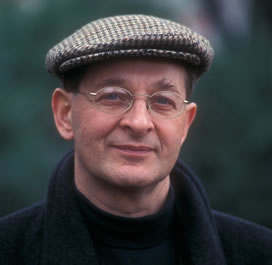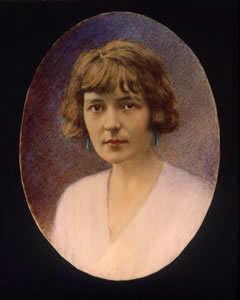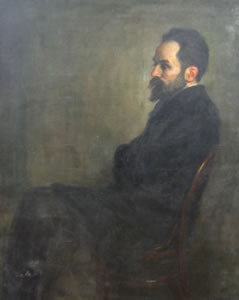De Amerikaanse dichter en schrijver Edward Estlin Cummings werd geboren in Cambridge, Massachusetts op 14 oktober 1894. E.E. Cummings studeerde af aan de universiteit van Harvard, en ging als vrijwilliger naar Frankrijk tijdens de Eerste Wereldoorlog. Na de oorlog bleef hij in Parijs, maar keerde later terug naar de VS. Al vanaf jonge leeftijd hield hij zich bezig met het schrijven van gedichten. Zijn eerste gepubliceerde collectie gedichten kwam van zijn manuscript uit 1922 met de titel Tulips & Chimneys (Tulpen & Schoorstenen). In zijn gedichten verwerpt hij de formele dichtvormen zoals stanza’s en het gebruik van metrum. Zijn stijl wordt verder gekenmerkt door typografische innovaties, zoals afwijkend hoofdlettergebruik (echter niet een volledig ontbreken van hoofdlettergebruik) en interpunctie, en door woorden of delen van woorden die weloverwogen over de pagina verspreid staan. Zijn gedichten komen hierdoor op het eerste gezicht vaak onsamenhangend over, totdat ze hardop gelezen worden. Naast gedichten heeft Cummings ook kinderboeken en korte verhalen geschreven. Ook was hij een verdienstelijk kunstschilder. Naast de snel in het oog springende typografische innovaties zijn de levensvreugde, de humor en soms het sarcasme, die uit de gedichten spreken, kenmerkend voor zijn werk. Zijn naam wordt, in navolging van zijn gedichten waarin Cummings met typografie experimenteerde, vaak zonder hoofdletters geschreven, e.e. cummings. Volgens Norman Friedman in Journal of the E. E. Cummings Society, (Voorjaar 1, 1992), zou zijn naam echter gewoon gespeld moeten worden — als E. E. Cummings dus. De schrijfwijze van zijn naam met kleine letters was een typografisch concept van een uitgever voor de omslag van één van zijn bundels, maar werd nooit gebruikt door Cummings zelf.
if i love You
if i love You
(thickness means
worlds inhabited by roamingly
stern bright faeries
if you love
me) distance is mind carefully
luminous with innumerable gnomes
Of complete dream
if we love each (shyly)
other, what clouds do or Silently
Flowers resembles beauty
less than our breathing
it is at moments after i have dreamed
it is at moments after i have dreamed
of the rare entertainment of your eyes,
when (being fool to fancy) i have deemed
with your peculiar mouth my heart made wise;
at moments when the glassy darkness holds
the genuine apparition of your smile
(it was through tears always)and silence moulds
such strangeness as was mine a little while;
moments when my once more illustrious arms
are filled with fascination, when my breast
wears the intolerant brightness of your charms:
one pierced moment whiter than the rest
-turning from the tremendous lie of sleep
i watch the roses
of the day grow deep.
you shall above all things be glad and young
you shall above all things be glad and young
For if you’re young,whatever life you wear
it will become you;and if you are glad
whatever’s living will yourself become.
Girlboys may nothing more than boygirls need:
i can entirely her only love
whose any mystery makes every man’s
flesh put space on;and his mind take off time
that you should ever think,may god forbid
and (in his mercy) your true lover spare:
for that way knowledge lies,the foetal grave
called progress,and negation’s dead undoom.
I’d rather learn from one bird how to sing
than teach ten thousand stars how not to dance

E. E. Cummings (14 oktober 1894 – 3 september 1962)
De Hongaarse schrijver Péter Nádas werd geboren op 14 oktober 1942 in Boedapest. Nádas studeerde eerst scheikunde en werkte jaren lang als fotograaf. Na de eerste publicatie van zijn verhalen in een tijdschrift in 1965 werd hij zelfstandig schrijver. In 1981 en 1982 verbleef hij op uitnodiging van de DAAD in West-Berlijn. Het verschijnen van zijn eerste roman The End of a Family Story werd lang door de censuur tegengehouden. Het boek verscheen pas in 1977. In 1985 verscheen het 1.300 bladzijden tellende A Book of Memories. De handeling hierin bestaat uit drie met elkaar verweven verhaallijnen. Eeen speelt in de DDR in de jaren zeventig, een rond de eeuwwisseling in Heilgendamm aan de Oostzee en een in Hongarije zelf tijdens de volksopstand van 1956. In 2005 verscheen de uit drie delen bestaande roman Parallel Stories.
Uit: SPURENSICHERUNG (2007)
Liegengebliebene Aufzeichnungen
eines Provinzjournalisten
Im Jahr nach der Kollektivierung
–Von Haus zu Haus ist er gezogen,Guten Tag bei den Lutheranern, Grüß Gott bei den Katholiken.
– Sie wollten um keinen Preis mit der Maschine melken.
– Auch Kálmán Perlaki wollte das nicht.
– Da kommt nichts dabei rum,wir werden alle verhungern, hat man gesagt.
– Und wenn der Apparat jetzt mal nicht geht,wollen sie nicht mit der Hand melken.
– Kuh mit drei Zitzen sagen die Leute dazu.
– Ehrlich gesagt, so geht das, auch Kálmán Perlaki war ja Kleinbauer.
Warum trittst du nicht in die Genossenschaft ein, hab ich ihn gefragt. Er hat mich genervt. Ehrlich gesagt war mir klar, daß man nichts dabei gewinnt. Aber was das betrifft, hab ich nie Anlaß zur Beschwerde gegeben. Ich kann zuhören. Wir sind sechs in der Familie. Ich habe ja schließlich auch Augen im Kopf, kann weitersehen! Mein Ältester ist bereits einundzwanzig.
Dem wird’s beim Militär besser gehen. Soll er dabei bleiben,
wenn er will.
– Da ist er richtig. Dieser Józsika wußte schon immer, wo’s langgeht.
– Also berichten Sie bitte über mich, daß ich kein so übler Schweinehund bin.
– So was kann man gar nicht berichten, denn wenn es so wäre, dann wäre er ja gar nicht hier.
Am 7.Februar abends hat der Vorsitzende durch seinen Sohn den Beschluß der Leitung überbringen lassen:
»Hiermit meldet der LPG-Vorsitzende, daß der Melker Kálmán Perlaki am 3. dieses Monats versucht hat, 8 kg von dem in Kollektiveigentum der LPG befindlichen Futterschrot zu entwenden. Außerdem fand ich 2 l Milch in seiner Aktentasche,die er sich gleichfalls ohne Erlaubnis und ohne Entgelt aneignen wollte. Es ist anzunehmen, aber nicht nachweisbar, daß es sich bei dem Mitglied Perlaki nicht um den ersten Fall dieser Art handelt. Der Leitung ist bekannt, daß er davon abgesehen auch gegen seine Mitarbeiter ein unverträgliches Benehmen zeigt, zum Beispiel, daß er im Affekt mit einer Heugabel auf den für das Futter zuständigen István Oroszi einstach,was einen Prozeß zur Folge hatte undwofür er auch bestraftworden ist.Mehrmals ist es vorgekommen, daß er sich sowohl dem Brigadier als auch dem Agronomen gegenüber arrogant und provokativ benommen hat.Dieser Mensch glaubt,wenn er nichtwäre,müßten wir den Viehbestand abgeben,was genug zeigt, wie eingenommen er von sich ist.Bei seinem kleinbäuerlichenDenken liegt ihm am Schicksal der Molkerei gerade soviel, daß er das Futtermittel plündert,damit wir nicht unerwartet bessere Ergebnisse auf dem Gebiet der Milch- und Fleischproduktion erzielen. Daher müssen wir davon ausgehen, daß seine jetzige Tat nur den Höhepunkt schon früher begangener Taten darstellt, welche für die Demokratie in der LPG und die Idee des großbetrieblichen Schutzes vonKollektiveigentum außerordentlich schädlich sind.
Deshalb wird das LPG-Mitglied Kálmán Perlaki gemäß Leitungsbeschluß mit sofortigerWirkung von seiner bisherigenArbeitstätigkeit als Melker abgesetzt und verpflichtet, am 8. Februar morgens um 6 Uhr im Leitungsbüro zu erscheinen.«

Péter Nádas (Boedapest,14 oktober 1942)
De Amerikaanse dichteres, essayiste, critica en feministe Katha Pollitt werd geboren op 14 oktober 1949 in New York. Het bekendst is Polett door haar column “Subject to Debate” in The Nation, maar zij publiceerde ook in diverse andere bladen als The New Yorker, Harper’s Magazine, Ms. magazine en The New York Times. In 1994 publiceerde zij Reasonable Creatures: Essays on Women and Feminism, een verzameling van negentien essays. In 1983 had zij een National Book Critics Circle Award ontvangen voor haar dichtbundel Antarctic Traveller. In 2006 verscheen Virginity or Death!: And Other Social and Political Issues of Our Time.
Small Comfort
Coffee and cigarettes in a clean cafe,
forsythia lit like a damp match against
a thundery sky drunk on its own ozone,
the laundry cool and crisp and folded away
again in the lavender closet-too late to find
comfort enough in such small daily moments
of beauty, renewal, calm, too late to imagine
people would rather be happy than suffering
and inflicting suffering. We’re near the end,
but O before the end, as the sparrows wing
each night to their secret nests in the elm’s green dome
O let the last bus bring
love to lover, let the starveling
dog turn the corner and lope suddenly
miraculously, down its own street, home.
Lilacs in September
Shocked to the root
like the lilac bush
in the vacant lot
by the hurricane–
whose black branch split
by wind or rain
has broken out
unseasonably
into these scant ash-
colored blossoms
lifted high
as if to say
to passersby
What will unleash
itself in you
when your storm comes?

Katha Pollitt (New York,14 oktober 1949)
De Nieuw-Zeelandse schrijfster Katherine Mansfield werd geboren op 14 oktober 1888 in Wellington. Zie ook mijn blog van 14 oktober 2006 en ook mijn blog van 14 oktober 2007.
Uit: Prelude
“1
THERE was not an inch of room for Lottie and Kezia in the buggy. When Pat swung them on top of the luggage they wobbled; the grandmother’s lap was full and Linda Burnell could not possibly have held a lump of a child on hers for any distance. Isabel, very superior, was perched beside the new handy-man on the driver’s seat. Hold-alls, bags and boxes were piled upon the floor. “These are absolute necessities that I will not let out of my sight for one instant,” said Linda Burnell, her voice tremb ling with fatigue and excitement.
Lottie and Kezia stood on the patch of lawn just inside the gate all ready for the fray in their coats
with brass anchor buttons and little round caps with battleship ribbons. Hand in hand, they stared with round solemn eyes first at the absolute necessities and then at their mother.
“We shall simply have to leave them. That is all. We shall simply have to cast them off,” said Linda Burnell. A strange little laugh flew from her lips; she leaned back against the buttoned leather cushions and shut her eyes, her lips trembling with laughter. Happily at that moment Mrs. Samuel Josephs, who had been watching the scene from behind her drawing-room blind, waddled down the garden path.
“Why nod leave the chudren with be for the afterdoon, Brs. Burnell? They could go on the dray with the storeban when he comes in the eveding. Those thigs on the path have to go, dod’t they?”
“Yes, everything outside the house is supposed to go,” said Linda Burnell, and she waved a white
hand at the tables and chairs standing on their heads on the front lawn. How absurd they looked!
Either they ought to be the other way up, or Lottie and Kezia ought to stand on their heads, too. And she longed to say: “Stand on your heads, children, and wait for the store-man.” It seemed to her that would be so exquisitely funny that she could not attend to Mrs. Samuel Josephs.
The fat creaking body leaned across the gate, and the big jelly of a face smiled. “Dod’t you worry, Brs. Burnell. Loddie and Kezia can have tea with by chudren in the dursery, and I’ll see theb on the dray afterwards.”
The grandmother considered. “Yes, it really is quite the best plan. We are very obliged to you, Mrs. Samuel Josephs. Children, say ’thank you’ to Mrs. Samuel Josephs.”
Two subdued chirrups: “Thank you, Mrs. Samuel Josephs,”

Katherine Mansfield (14 oktober 1888 – 9 januari 1923)
De Poolse schrijver Stefan Żeromski werd geboren op 14 oktober 1864 in Strawczyn in de buurt van Kielce. Zie ook mijn blog van 14 oktober 2006.
Uit: Forebodings (Vertaald door Marie Busch)
„I had spent an hour at the railway station, waiting for the train to come in. I had stared indifferently at several ladies in turn who were yawning in the corners of the waiting-room. Then I had tried the effect of making eyes at a fair-haired young girl with a small white nose, rosy cheeks, and eyes like forget-me-nots; she had stuck out her tongue (red as a field-poppy) at me, and I was now at a loss to know what to do next to kill time.
Fortunately for me two young students entered the waiting-room. They looked dirty from head to foot, mud-bespattered, untidy, and exhausted with travelling. One of them, a fair boy with a charming profile, seemed absent-minded or depressed. He sat down in a corner, took off his cap, and hid his face in his hands. His companion bought his ticket for him, sat down beside him, and grasped his hand from time to time.
‘Why should you despair? All may yet be well. Listen, Anton.’
‘No, it’s no good, he is dying, I know it…. I know… perhaps he is dead already.’
‘Don’t believe it! Has your father ever had this kind of attack before?’
‘He has; he has suffered from his heart for three years. He used to drink at times. Think of it, there are eight of us, some are young children, and my mother is delicate. In another six months his pension would have been due. Terribly hard luck!’
‘You are meeting trouble half-way, Anton.’
The bell sounded, and the waiting-room became a scene of confusion. People seized their luggage and trampled on each other’s toes; the porter who stood at the entrance-door was stormed with questions. There was bustle and noise everywhere. I entered the third-class carriage in which the fair-haired student was sitting. His friend had put him into it, settling him in the corner-seat beside the window, as if he were an invalid, and urging him to take comfort. It did not come easy to him, the words seemed to stick in his throat. The fair-haired boy’s face twitched convulsively, and his eyelids closed over his moist eyes.
‘Anton, my dear fellow,’ the other said, ‘well, you understand what I mean; God knows. You may be sure… confound it all!’
The second bell sounded, and then the third. The sympathizing friend stepped out of the carriage, and, as the train started, he waved an odd kind of farewell greeting, as if he were threatening him with his fists.“

Stefan Żeromski (14 oktober 1864 – 20 november 1925)
